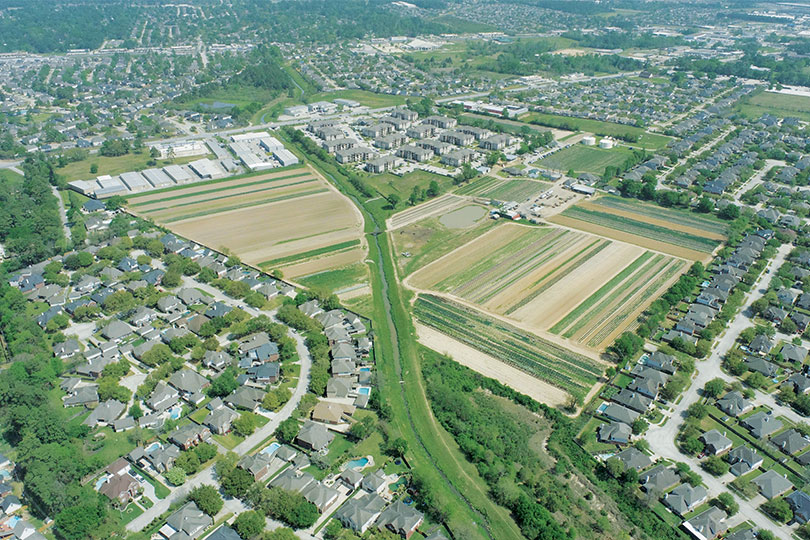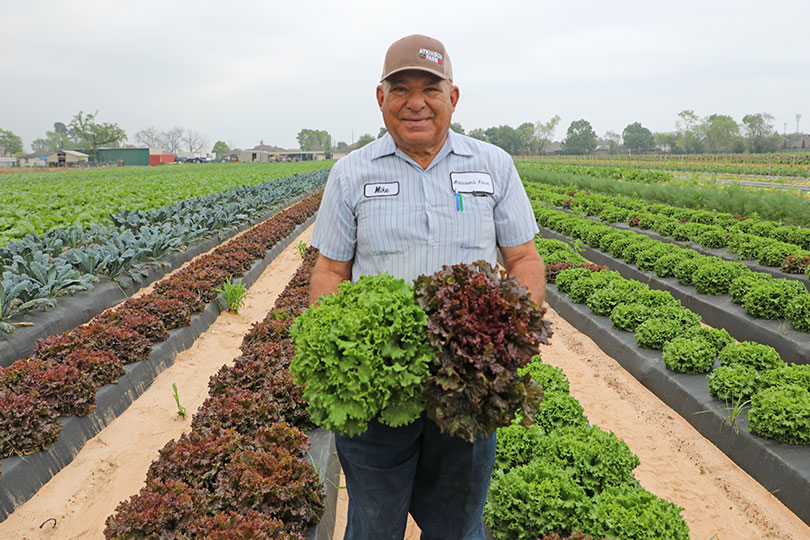By Julie Tomascik
Editor
From strawberries to blueberries and collards to kale, Mike Atkinson’s fields yield a bountiful harvest for his Houston neighbors.
His farm in Spring, on the outskirts of Houston, thrives despite urban encroachment.
“When we came here in 1961, I’d tell everybody we’re a mile-and-a-half from I-45, and we’re the third house on the left. Now, we’re the third million house on the left,” he said. “There’s not much farmland left. Farmland in Klein and Spring is all good farmland, and a lot of the good farmland in this part of the world is covered up with houses and concrete, roads, people and apartments.”

But the houses upon houses in the surrounding subdivisions also bring opportunity for Mike and his family.
The fruits and vegetables they grow are sold to local restaurants and in a market on their farm. They also have strawberries and blueberries for families to come out and pick on their own.
“It’s fun to see the families come out, and we do tours here all the time, too. A lot of times people really don’t understand when they’ve lived in the concrete jungle of Harris County, they don’t understand what it’s like to come to a farm. They think potatoes grow on a tree. They don’t know carrots grow underneath the ground,” Atkinson, a Harris County Farm Bureau member, said. “There’s a lot of things that a lot of the inner-city people do not understand. It’s a cultural shock to them when they come to the farm. They’ll say they didn’t know all of this took place so close to Houston.”
In the spring, Atkinson grows strawberries and then transitions to tomatoes, peppers, eggplants, cucumbers and squash, among others.
He grows broccoli, collards, mustard, turnips, kale, spinach, beets, radishes and many more vegetables in the fall.
Atkinson and his employees harvest everything by hand and deliver it to stores and restaurants in the area.
“We sell to 22, and we are really not looking to get any more. That’s all we can do,” he said. “We want to give real good service to the restaurants that we do have. That’s a main thing. We’re service-oriented.”
It’s a quick turnaround from field to local restaurants.
“What we harvest today, we’ll take to the restaurants first thing in the morning. Everything is picked today and sold tomorrow, and even a lot of times, it’s picked today and sold today,” he said.
But they are working to transition to more u-pick and agritourism opportunities, as well as the on-farm market, and away from the bulk wholesale produce.
They started the market in 2004.
“It was my wife’s idea,” he said. “Every year, it’s kind of gotten bigger and bigger.”
Expanding the on-farm market and u-pick options will offer some flexibility to Atkinson and his crew.
“We’re leaning to get a little more from the bulk wholesale produce into the u-pick and the agritourism part of people coming here directly to the farm and purchasing stuff here,” he said. “It’s easier for us. We don’t have to worry about driving down the road and going anywhere. We can get a lot more done in a day’s time if we’re here at the farm.”
And with the increasing costs for fuel, fertilizer and seed, Atkinson is looking for ways to maximize his productivity.
Last year, Atkinson paid about $450-$500 a ton for fertilizer.
“Now, it’s over $1,200 a ton. It’s tripled in price,” he said.
And fuel costs are climbing, too.
“Last year, we were running through $2,000 worth of fuel a month, and now we’re running through $5,000 worth of fuel a month,” he said. “We’re doing the same thing. We’re not doing any more. It’s just the cost has gone up, and anything that we have to get shipped in here to use is just an astronomical amount in freight.”
But despite the challenges that urban sprawl and increased production costs bring, Atkinson doesn’t want to do anything else other than farm.
“It’s all I’ve ever done. I don’t know what it’d be like to do anything else,” he said. It’s hard, but like I say, that’s all I’ve ever done. I won’t ask anybody who works for me to do anything that I haven’t done. I guess in business, no matter what, you got to start out at the bottom and work your way to the top. This day in time, I’d rather be out here harvesting by hand. I don’t care how hot it is. I don’t care what we’re picking—cucumbers, tomatoes, watermelons. I don’t care what it is. I’d rather be out there than all the other stuff that I have to deal with on a daily basis about getting fertilizer, ordering this, taking care of this, writing this, going there, doing this.”
To put it simply, Atkinson likes being a farmer, and his Houston neighbors and customers appreciate what he brings to their tables.

